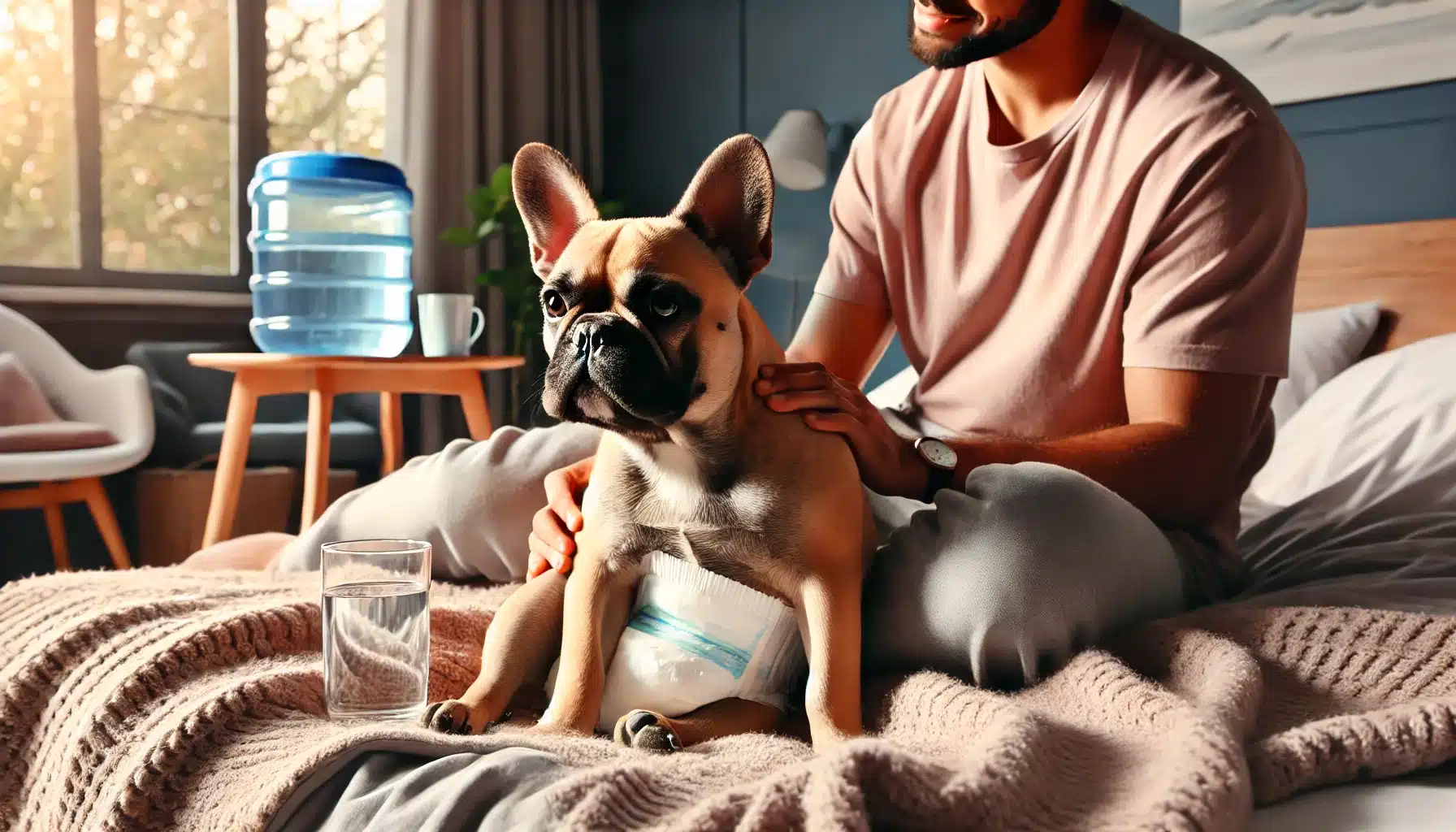Feeding your French Bulldog the right amount of puppy food is crucial for their health and happiness. These lovable pets have specific dietary needs that should be met to keep them in top shape. From the age and weight of your Frenchie to their activity level and health status, every factor plays a role in their diet.
Whether you have a French Bulldog puppy or an adult dog, it is important to provide a balanced diet that includes high-quality meats like chicken and beef and essential nutrients such as proteins, vitamins, and omega fatty acids. Avoid processed food and animal derivatives, and opt for natural foods like rabbit or lean meats.
Regular check-ins with your vet can help ensure that your Frenchie’s diet supports their muscle health and overall well-being. This guide will help you understand how to adjust their food intake and diet to fit their changing needs and ensure they stay happy and healthy.
Understanding Your French Bulldog’s Dietary Needs
French Bulldogs, or “Frenchies,” are a small but muscular breed with unique dietary requirements. Their compact size and distinctive build mean they need a well-balanced diet that supports their energy levels, muscle maintenance, and overall health.
Key Nutritional Needs:
- Protein: Supports muscle growth and maintenance.
- Fat: Provides energy and supports skin and coat health.
- Carbohydrates: Offer a quick source of energy.
- Vitamins and minerals are crucial in the best food for your French Bulldog’s diet and are essential for overall health and well-being.
How to Determine the Right Amount of Dog Food for Your French Bulldog
The food your French Bulldog needs depends on several factors, including age, weight, activity level, and health status. Here’s how to figure out the right portion size for your dog:
Consider Their Age
- Puppies (8 weeks—12 months): Growing French Bulldog puppies need more calories and nutrients to support their rapid development. They should generally be fed three to four times a day.
- Adult Frenchies (1 – 7 years) should be fed a balanced diet that meets their needs as they transition from puppy food. They should be fed twice daily, in portions based on their activity level and weight.
- Seniors (7+ years) may need adjustments in their adult dog food to suit their changing dietary needs.: Older dogs may require fewer calories and a diet that supports joint health and digestion.
Weigh Your Dog Regularly
To help your Frenchie lose weight, start by adjusting their food portions and choosing lean meat types like chicken or turkey. Stick to recommended portion sizes to ensure you’re not overfeeding. Increase their activities with more frequent walks or playtime to boost their metabolism. Be cautious, as excess weight can threaten their health, so monitoring their rib visibility can be a good indicator of progress. Combining controlled portions with increased activity can help your Frenchie achieve a healthier weight.
- Weighing your French Bulldog regularly helps monitor their weight and aBulldogood portions accordingly.
- A healthy adult French Bulldog typically weighs between 16-28 pounds (7-13 kg).
Calculate Caloric Needs
- Use the formula to determine how much pet food to feed your French Bulldog based on its age and weight. Estimate daily caloric needs using 30 calories per pound of body weight per day.
- For example, a 20-pound Frenchie needs about 600 calories per day.
Choosing the Right Dog Food & nutrients for Your French Bulldog
Selecting the right food & nutrients is just as important as determining the correct portion size. Your French Bulldog’s diet should include high-quality ingredients that meet their nutritional needs, ensuring they eat the best dog food.
Types of Dog Food
- Dry Kibble: Convenient and helps maintain dental health.
- Wet food can be a great option for French Bulldogs, especially when served in a dog bowl. It is moist and flavorful, but it should be balanced with dry food for dental health.
- Raw Diet: Some owners prefer a raw diet, but it requires careful planning to ensure it’s nutritionally complete.
Look for high-quality ingredients in the food for your Frenchie to ensure optimal health.
- Choose dog food that lists meat as the first ingredient.
- Avoid fillers like corn, soy, and by-products in the food for your Frenchie to maintain a healthy diet.
- Look for foods with added vitamins and minerals.
Consider Special Dietary Needs
- Allergies can affect what a French Bulldog eats, so dog owners need to monitor their pet’s reactions to different pet foods. Some French Bulldogs are prone to food allergies. Common allergens include chicken, beef, and grains.
- Sensitive stomachs in French Bulldogs may require special attention to food ingredients in their diet. Opt for easily digestible foods with limited ingredients that suit your bulldog diet.
How Often Should You Feed Your French Bulldog?
The frequency of feeding your Frenchie can impact their digestion and energy levels. Here’s a breakdown of how often you should feed them based on their age:
Puppies (8 weeks – 12 months)
- 3-4 times a day: Puppies have higher energy needs and smaller stomachs, so frequent, small meals are ideal.
Adults (1 – 7 years)
- Twice a day: Split their daily food intake into two meals to maintain consistent energy levels.
Seniors (7+ years)
- 1-2 times a day: Depending on their activity level, seniors may benefit from one or two meals of high-quality adult dog food daily.
Signs Your French Bulldog is Eating the Right Amount
It’s essential to monitor your French Bulldog’s health and behaviour to ensure they are eating the right amount of food ingredients. Here are some signs that your dog is getting the right amount of food in their food bowl.
Healthy Weight
- Your dog should have a visible waist when viewed from above.
- You should be able to feel their ribs without pressing hard.
Energy Levels
- Consistent energy levels throughout the day indicate balanced nutrition.
- Excessive lethargy or hyperactivity could signal overfeeding or underfeeding.
Healthy Coat and Skin
- A shiny coat and healthy skin are signs of good nutrition.
- Dry, flaky skin or a dull coat may indicate a dietary imbalance.
Adjusting Food Portions Based on Activity Level
Your French Bulldog’s activity level plays a significant role in determining how much food they need. A more active dog will burn more calories and may require more food for your Frenchie.
Active French Bulldogs
- Dogs that get regular exercise or participate in activities like agility training will need more calories to fuel their energy.
- Consider a slight increase in their daily meal to accommodate their heightened activity level.
Less Active French Bulldogs
- If your dog is more passive or spends most of the day indoors, they may require fewer calories.
- Monitor their weight and reduce portions of high-calorie food if they start to gain excess weight.
How to Transition Your French Bulldog Puppy to a New Diet
Changing your French Bulldog Puppy’s diet should be done gradually to avoid digestive upset. Here’s how to feed a French Bulldog properly, ensuring you choose the best food for your Frenchie.
Slowly Introduce New Food
- Start by mixing a small amount of the new food with their current food.
- Gradually increase the amount of new food over 7-10 days until it’s the only food they eat.
Monitor for Reactions
- Watch for any signs of digestive upset, such as diarrhoea or vomiting.
- If your dog reacts, slow down the transition process.
Consult Your Veterinarian
- Consult your veterinarian if you’re unsure about changing your dog’s diet.
Common Feeding Mistakes to Avoid for this dog breed
Feeding your French Bulldog the right way involves more than just portion control. Avoid these common feeding mistakes to ensure your doBulldog healthy:
Overfeeding
- Overfeeding can lead to obesity, which is a common issue in French Bulldogs.
- Stick to the recommended portion sizes and avoid giving too many treats.
Feeding Table Scraps
- Human food can harm dogs, especially fatty, spicy, or toxic foods.
- Avoid feeding your dog table scraps, leading to weight gain and health issues.
Inconsistent Feeding Schedule
- Feeding your dog at irregular times can disrupt its digestion and energy levels, so it’s important for dog owners to establish a routine.
- Stick to a consistent feeding schedule to promote good digestion and routine.
The Role of Treats in Your Frenchie Diet
Treats are a great way to reward your French Bulldog but should be given in moderation. Here’s how to incorporate treats into their diet:
Use Treats for Training
- Treats can be a valuable tool for training and reinforcing good behaviour.
- Choose low-calorie treats to avoid excessive calorie intake.
Limit Treats
- Treats should comprise no more than 10% of your dog’s daily caloric intake.
- Over-treating can lead to weight gain and nutritional imbalances, so dog owners must monitor how much they let their bulldog eat.
Choose Healthy Treats
- Opt for treats made with natural ingredients and no artificial additives.
- Use fruits and vegetables, such as bulldog carrots or apples, as low-calorie treat options.
FAQs About Feeding Your Frenchie
How much should I feed my French Bulldog puppy?
French Bulldog puppies need more frequent meals. Feed them 3-4 times daily, with portion sizes based on weight and growth stage.
Can I feed my French Bulldog human food?
It’s best to avoid feeding your dog human food. Many human foods are toxic to dogs; even safe foods can disrupt their balanced diet.
What if my French Bulldog is gaining too much weight from their commercial dog food?
If your dog is gaining weight, reduce portions and increase their physical activity. Consult your veterinarian for personalized advice.
Is a raw diet good for French Bulldogs, or should they stick to commercial dog food?
A raw diet can be beneficial but requires careful planning to ensure it’s nutritionally complete. Consult your veterinarian before switching to a raw diet.
How do I know if my French Bulldog is underfed and not getting enough nutrients from their puppy or adult dog food?
Signs of underfeeding include weight loss, low energy, and a dull coat. If you suspect your dog is underfed, increase their portion sizes and consult your vet.
Conclusion
Feeding your Frenchie Puppy the right nutrition is essential for their health and well-being. Understanding their unique dietary needs, choosing high-quality food, and adjusting portions based on their activity level and age can help your Frenchie live a long, healthy, and happy life. Regularly monitor their weight and consult your veterinarian to ensure your French Bulldog gets the right nutrition at every stage of their life.







